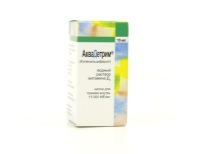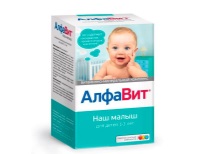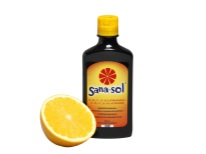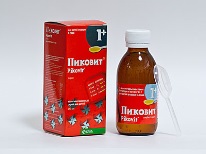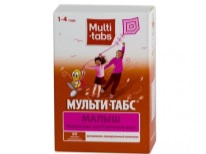Vitamins for children older than 1 year
Taking care of the health of the child, parents pay attention to the nutrition of the baby, but it is not always possible to feed the baby according to a balanced and rational menu. Not always food is able to provide your baby with all the vitamins. In such cases, vitamin supplements will come to the rescue.
Depending on their age, they will have different forms of release, different combinations of vitamins and their different dosages. Let's look at what the nuances should be paid attention to when choosing vitamins for a child from 1 year.
Vitamins play an important role for the development of the child and his growth, and the lack of any of the vitamins threatens the baby with problems with health and well-being. Before the year, babies usually have enough vitamins that are contained in the mother’s milk or milk formula, and after 1 year the needs increase.

At the age of one year, it is important to pay attention to the sufficient intake of such vitamins in the body:
Vitamin | Action on the child's body | Needs for a one year old child per day |
BUT | It is important for the growth of the child. Affects the vision and condition of the mucous membranes. Affects immunity. | 1350 IU or 450 mcg |
D | Participates in bone development and of teeth. Affects the exchange of phosphorus and calcium in the children's body. | 400 IU or 10 mcg |
WITH | Important for the elasticity of blood vessels and the state of connective tissue. Strengthens the body's defenses. | 40 mg |
IN 1 | It is important for all metabolic processes and intestinal work. Participates in the transmission of nerve impulses. | 0.7 mg |
AT 2 | Participates in energy production and metabolic reactions. Affects the condition of the mucous membranes and skin. Maintains eye health. | 0.8 mg |
AT 5 | It is important for the exchange of fats, in particular cholesterol. Affects the formation of antibodies and hormones. | 3 mg |
AT 6 | Takes part in blood formation and formation of antibodies. | 1 mg |
AT 9 | Need for the formation of cells. | 50 mcg |
AT 12 | It is important for the nervous system. Participates in the processes of blood formation. | 0.7 µg |
PP | Affects the formation of hemoglobin. It is important for the normal state of the skin and the digestive tract. | 9 mg |
H | Important for the condition of hair and skin, as well as nails. Participates in metabolic processes. Affects the functioning of the liver. | 20 mcg |
E | Strong antioxidant. Affects the work of the heart and vascular walls. Helps in the absorption of other vitamins. | 6 mg |
Indications and contraindications
Vitamin remedies give to kids older than a year, if:
- The child eats unbalanced and defective.
- The baby has high physical and neuro-psychological stress.
- Parents want to prophylactically increase the body's resistance to infectious diseases and colds.
- The child recovers from acute illness.
- Crumbs have diseases that prevent the absorption of nutrients from food.
Vitamin complexes should not be given to one-year-old children with hypervitaminosis detected in a child, with intolerance to any of the vitamins, as well as with kidney diseases.
Children 1-2 years old should not be given drugs that include vitamin K, since taking such complexes has a bad effect on immunity and can cause bleeding.
Forms of release
Assigned vitamins to children from 12 months are usually in the form of:
- Sweet syrup.
- Powder to mix with drink or food.
- Chewable tablets.
- Gel.
Most often, children older than a year are advised to give liquid vitamin complexes, as it is easier to swallow them. In most cases, these funds have a pleasant taste, but due to the presence of flavors and dyes can cause allergies.
Top review
The most popular and common vitamin supplements for children older than one year are the following drugs:
Title | Release form | Dosage at 1 year | Special features |
Drops | 1 drop per day | The supplement is an aqueous solution of one vitamin (Vit. D) and its use is aimed at preventing the deficiency of this vitamin, and it is indicated if a shortage of vitamin D has already appeared. | |
Alphabet Our baby | Powder | One portion (3 sachets with powder) per day | The daily dose in the form of three powders is dissolved separately and given three times during the main meals. Dissolve the powder in warm water (about 30 ml) should be immediately before use. |
Sana-sol | Syrup | 5 ml per day | In addition, there is no vitamin B12. Due to the presence of sorbitol in the composition of the drug may adversely affect the work of the gastrointestinal tract. |
Peaks 1+ | Syrup | 10 ml per day | The additive is represented by a sweet yellow-orange syrup with a pleasant smell, so children usually like it. The drug is characterized by high dosages of ascorbic acid, thiamine, vitamin PP and riboflavin. Allergic reactions to such a complex are very rare. |
Kinder Biovital | Gel | 5 g of gel per day | The main advantages of the drug - a convenient form of release, as well as the best composition for children. The additive is a sweet and sour viscous gel with a pleasant fruity aroma. It can be spread on cookies. In addition to vitamins in this supplement is lecithin. |
Multi-tabs baby | Pills | 1 tablet per day | The drug has a positive effect on the immune system and contributes to the harmonious growth of the child. The complex has a high dose of vitamin D. For children under 18 months, the tablet is divided into 4 parts or crushed into powder and added to food. |
Tips
- The main difference of vitamin supplements for children is the optimal dosage of their components for a certain child's age, so giving vitamins older than 2 years to kids older than a year is unacceptable.
- If a child has any diseases, they should be given vitamins only as directed by the doctor. But even before buying a vitamin complex, a healthy baby should consult with your pediatrician to clarify the possible contraindications of your child to vitamin therapy. The doctor will evaluate the health of the crumbs and tell you which complex is best suited.
- Many vitamin complex supplements are supplemented with mineral and other beneficial substances. Pay attention to their dosage.
- Be especially careful when choosing a vitamin remedy for a child with allergies. Many drugs include dyes and other chemical compounds that are dangerous for such a child. Give preference to powder additives, as they contain fillers in a smaller amount.

A great alternative is nutrition.
Many parents believe that there is no need for pharmacy vitamin preparations for the child, since all the necessary vitamins are present in food. With this approach, it is important to pay close attention to the balance of the baby's diet. The child should prepare a variety of dishes from fresh and high-quality products. ABOUT baby menu in 1 year read in another article.
In the diet of crumbs must be present vegetable dishes, dairy products, meat and fish, mashed potatoes and juices from fruits and berries, vegetable oil, cereals and bread, fresh greens and many other products.It is also important to remember about the production of vitamin D in the skin of a child during sun exposure, so on a warm sunny day (especially in winter and early spring) the child must be under the rays of the sun for a while.
Opinion E. Komarovsky
A popular doctor considers vitamins to be important and beneficial substances, however, he recommends taking vitamin remedies only with a confirmed deficiency of a certain vitamin. Multi-component vitamin supplements Komarovsky calls only a means to enrich the pharmaceutical companies.
Before you buy vitamins for a child, a well-known pediatrician advises to make sure that the child is feeding on a variety of foods. If a baby receives products from such groups as cereals, meat, fruits, dairy products and vegetables (at least 1 product from each group), such food, according to Komarovsky, is quite diverse. The pediatrician does not support the idea of “taking vitamins just in case,” especially when it comes to children.
For more on this, see the transfer of Dr. Komarovsky.


